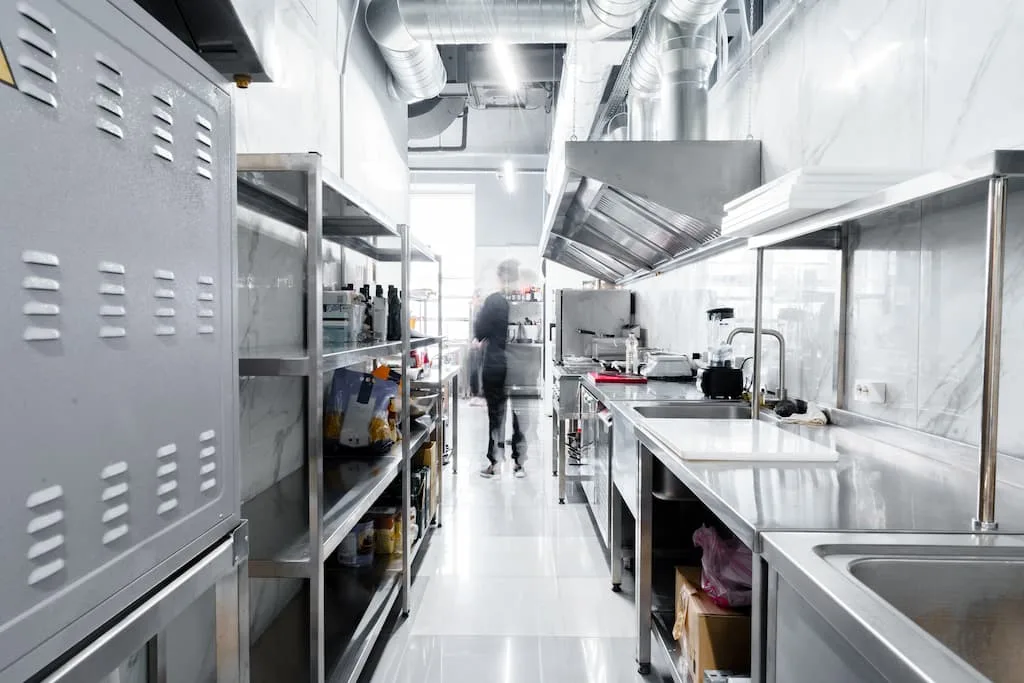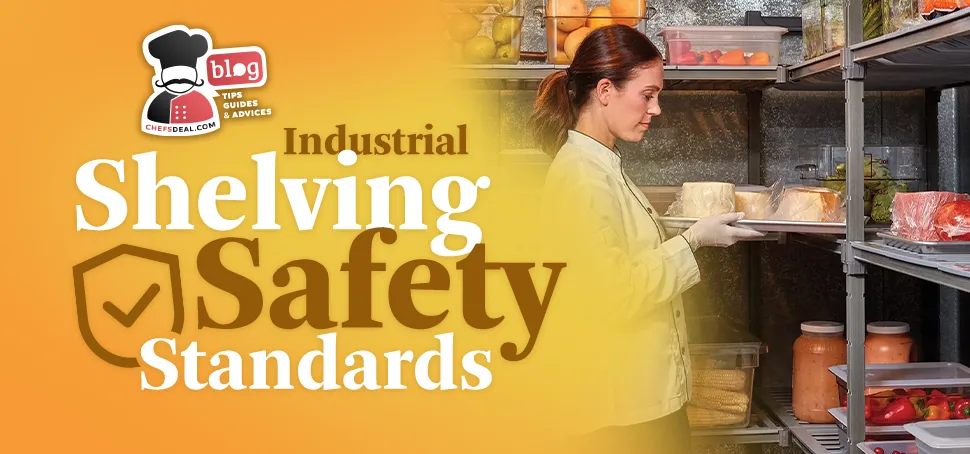Commercial kitchen flooring is the literal foundation of your kitchen and requires specific attention. Making the right choices regarding flooring helps you create a safe, healthy, and reliable environment for you and your staff. There are mainly 4 types of commercial kitchen flooring, each offering unique advantages to your workspace. You can consider your needs and priorities and choose the best material and measures for your commercial kitchen flooring.
What is the Significance of Commercial Kitchen Flooring?
Commercial kitchen flooring plays a significant role in keeping your kitchen healthy and safe. Since it shoulders the foot traffic and the heavy machinery of your kitchen, its impact on your business is inescapable. Ensuring you have good commercial kitchen flooring will provide your business running smoothly. Here are some ways flooring can be important:
- The main function of flooring is to provide a sturdy and durable surface for your business. The floors and finish should be sturdy enough to withhold the weight of the equipment and the staff. This issue is especially important in floorless walk-in refrigerators and freezers. Also, it should be durable enough to withstand high/low temperatures, heavy foot traffic, chemicals, moisture, and similar nuisances that might appear in a commercial kitchen.
- Ensuring safety and preventing accidents is possible by picking the right kind of commercial kitchen flooring. The floors should be slip-proof and even. Irregularities and wrong materials could lead to accidents.
- Promoting hygiene and cleanliness is a major benefit of good commercial kitchen flooring. With the right materials, you can ensure that spilled juices or foods are not absorbed but cleaned for good instead. Additionally, good flooring will have very few gaps, if at all, and won’t harbor bacteria between cracks or hard-to-clean places.
What are the Impacts of Flooring on Commercial Kitchen Equipment?
- Supporting proper equipment installation and operation is one of the key functions of commercial kitchen flooring. The flooring should be sturdy enough to withhold the weight of the equipment, and it should have the proper design to support the installation of various pieces of equipment.
You shouldn’t need to pierce the flooring to affix machinery to the ground since this would create gaps that might harbor accumulation of dirt and growth of bacteria.
- Enhancing efficiency and productivity is a great benefit you can get from good commercial kitchen flooring. Good floors will be easy to traverse, suitable for wheeled equipment like trolleys, and will overall provide a smooth and even ground for your operations.
Types of Commercial Kitchen Flooring
You can choose from several types of commercial kitchen flooring during a kitchen design and layout process. Each material has unique properties that can contribute to the well-being of your operations.
1. Ceramic tile flooring is an aesthetic option for a stylish kitchen. They are fairly cheap and easy to clean. However, due to the gaps between tiles, it is prone to cracking and getting liquids under the tiles, which creates health hazards. If you opt for bigger tiles with fewer gaps, you can decrease the chances of bacteria growth, but you will still need to periodically maintain the tiles and replace the cracked ones as soon as possible. Since tiles are relatively more delicate than other commercial kitchen flooring options, you might need to pay higher maintenance fees.
2. Epoxy flooring is a fairly common flooring type in commercial settings. Its installation is quite fast, and the material tends to be very durable. Its watertight gapless structure makes it a hygienic option. However, you should look into the material’s details to ensure that it is fit for commercial use and includes good materials, such as quartz, if it is a blend. If you invest in a good version of epoxy flooring, it is bound to last at least a decade.
3. Vinyl Flooring is another option you can consider. It comes in various models which offer various degrees of slip resistance. Slip resistance is an important consideration in commercial settings; however, vinyl flooring, in general, might not prove as useful as you’d hope. Due to the gaps and seams in its installation, it will require extra attention when cleaning and require more frequent maintenance. Plus, you might need to replace them sooner than other types of flooring.
4. Concrete Flooring is strong and durable and can withstand impacts. The material’s sturdiness alone makes it a good option for many businesses. It is a reliable option since it will last for at least 8-10 years. However, its hard surface can be demanding on your staff as it is not very comfortable, and beyond comfort, you should know that it is a porous surface that will absorb and accumulate bacteria and mold over time. You might need an additional layer on top of the concrete flooring to pass health inspections and provide a more comfortable space for your staff. Epoxy and rubber coatings are often preferred with concrete floorings.
Out of all the options best commercial kitchen flooring tends to be good forms of epoxy flooring, as it has longevity and offers a hygienic environment.
What are the Factors to Consider When Choosing Commercial Kitchen Flooring
There are several points you should keep in mind when choosing commercial kitchen flooring.
1. Safety and Slip Resistance: Slipping and tripping are common hazards in commercial kitchens. Constant use of liquids and moisture from the steam can make the floors wet and create hazards. A slip-resistant floor will minimize the chances of anyone slipping and injuring themselves. Slip resistance can be achieved through coatings as well.
2. Durability and Resistance to Wear: Commercial kitchens have heavy foot traffic and equipment. These factors impact your floors and cause wear and tear over time. Good flooring will be able to withstand these factors without breaking or chipping. The material’s durability will ensure that no cracks or chips that might harbor bacteria occur. In general, vinyl and small tile flooring might not be as durable as concrete and epoxy alternatives.
3. Resistance to Moisture and Chemicals: The steam from the cooking station create a lot of moisture in the kitchen. The humidity needs to be removed through exhaust systems. The flooring should not absorb it since it might contribute to bacterial growth. Also, commercial environments need thorough disinfection regularly. The flooring should withstand the chemicals required for cleaning and sanitizing.
4. Ease of Cleaning and Maintenance: This can be achieved properly by just choosing the right commercial kitchen flooring. Tiles will be harder to clean and maintain than epoxy and concrete flooring due to the gaps between the tiles, even though they are easy to sweep and wipe. Concrete will pose dangers to your health since it is a porous surface. Opting for a non-porous surface with little to no gaps is your best bet for an easy-to-clean and maintain kitchen floor.

How to Ensure Proper Installation and Maintenance Kitchen Flooring
Commercial kitchen flooring installation and maintenance can take time since you need to empty the kitchen and work on the ground. You need to minimize the downtime to get back into business as soon as possible. Getting professional help during the installation stage will ensure that downtime is kept to a minimum and the floor is installed evenly and without gaps. Before you set on this job, ensure you have a place to store all your machinery and enough time to properly finish the job.
When the new commercial kitchen flooring is installed, you must ensure you have a plan for cleaning and maintaining it. Regular cleaning prevents dirt and mold accumulation for all flooring types. Yet, despite your best efforts, problems might occur. Vinyl might crack, tiles can get mildew under them, and concrete might absorb liquids and more. You should periodically maintain the flooring by monitoring such problems and taking care of them as soon as possible. Replace the broken pieces and thoroughly sanitize the flooring regularly.
Conclusion
Choosing the right commercial kitchen flooring impacts the health and comfort of your staff and customers. It makes your job significantly easier by providing a durable and reliable ground for your machinery and operations. You will face fewer health, tripping, and slipping hazards and need fewer replacements. For the good of your business and kitchen, make sure that you choose the right commercial kitchen flooring and care for your floors carefully.
You may also wish to read our other articles related to commercial kitchen flooring.






